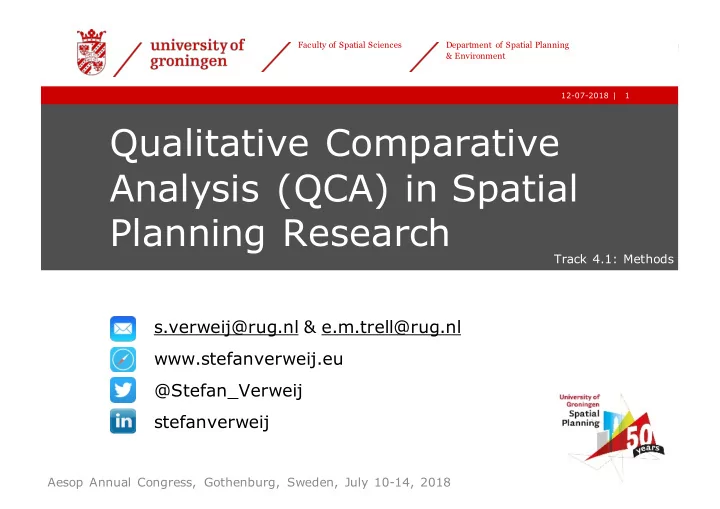

Faculty of Spatial Sciences Department of Spatial Planning 13-02-2018 | 1 & Environment 12-07-2018 | 1 Qualitative Comparative Analysis (QCA) in Spatial Planning Research Track 4.1: Methods s.verweij@rug.nl & e.m.trell@rug.nl www.stefanverweij.eu @Stefan_Verweij stefanverweij Aesop Annual Congress, Gothenburg, Sweden, July 10-14, 2018
2 13-02-2018 | 2 Spatial Planning Research › Providing input for policy change and institutional-spatial design in order to guide spatial and social developments › In some way or another, this involves comparison - Either between cases… - Or with a framework ultimately built on known examples and previously researched cases › Booth: “the desire to make comparisons [has] been fundamental to research activity in the field of spatial planning” Source: Alexander (2016); Booth (2015)
3 13-02-2018 | 3 Spatial Planning Research › However, comparison and transfer of knowledge (from case-to-case or from theory- to-case) is challenging : - Spatial planning practices and conditions are very context-specific - So how and to what extent do lessons learned transfer to other cases? › Booth: “the conditions that make a policy or practice work in one place are unlikely to obtain in another” › This is where QCA comes in Source: Booth (2015); Janssen-Jansen et al. (2008)
4 13-02-2018 | 4 Qualitative Comparative Analysis [C*I*M] + [~C*I*M] à O … can be minimized into [I*M] à O Source: Verweij et al. (2013)
5 13-02-2018 | 5 Valuable Method › QCA is a valuable method for spatial planning research - Systematic approach to comparison and lesson transfer
6 13-02-2018 | 6 Introducing QCA › QCA is potentially valuable, but yet little used; also errors occurring › Therefore, introducing QCA to the Spatial Sciences › How? - Systematic literature review of QCA in SPARD (‘Spatial Planning and Related Disciplines’) Book: Gerrits & Verweij (2018)
7 13-02-2018 | 7 Research Questions 1. When, where, and how is QCA used in SPARD? - Descriptive analysis of QCA-studies in SPARD 2. What are the ways forward for QCA in spatial planning research? - Analysis of ‘good practices’ in the QCA- studies in SPARD (Schneider & Wagemann, 2010) - Analysis of stated usefulness of QCA
8 13-02-2018 | 8 Method and Data Selecting articles 1. Subject fields in Scopus of ‘Geography, Planning and Development’, ‘Transportation’ and ‘Urban Studies’ (427,255 documents) 2. Limiting: articles, in English, years 1987-2017 (282,267 articles) 3. Limiting: QCA-keywords (349 articles) 4. Selecting and coding empirical QCA-articles that are actually are in SPARD à 33 articles Keywords based on: Seny Kan et al. (2016); Gerrits & Verweij (2016; 2018)
9 13-02-2018 | 9 RQ1: Variants of QCA
10 13-02-2018 | 10 RQ1: Disciplines and UoA
11 13-02-2018 | 11 RQ1: Data Sources
12 13-02-2018 | 12 RQ1: Cases and Conditions Many Qualitative Research Comparative Aspects of Cases Research Quantitative Research Few Number of Cases Source: Ragin (1994) Few Many
13 13-02-2018 | 13 RQ1: Visualization Sources: Busscher et al. (2018) Verweij et al. (2017)
14 13-02-2018 | 14 RQ2: Good Practices › Often unclear which analytical choices have been made à instigating good practices
15 13-02-2018 | 15 RQ2: Stated Usefulness › QCA is sensitive to context (N=10) › QCA enables small-n comparison and bridging qualitative-quantitative gap (N=14) › QCA enables studying complex wholes (N=21): conjunctural causation, asymmetry, complexity theory
16 13-02-2018 | 16 Conclusions › However… › Getting it right: ensuring good QCA-practices › Addressing time and dynamics with QCA › More applications of QCA in spatial planning research
17 13-02-2018 | 17 References › Alexander, E.R. (2016). There is no planning – Only planning practices: Notes for spatial planning theories. Planning Theory , 15(1), 91–103. › Booth, P. (2015). What can we learn from France? Some reflections on the methodologies of cross- national research. In E.A. Silva, P. Healey, N. Harris, & P. Van den Broeck (Eds.), The Routledge Handbook of Planning Research Methods (84–96). Abingdon: Routledge. › Busscher, T., Van den Brink, M. & Verweij, S. (2018). Strategies for integrating water management and spatial planning: Organizing for spatial quality in the Dutch ‘Room for the River’ program. Journal of Flood Risk Management. › Gerrits, L.M., & Verweij, S. (2016). Qualitative comparative analysis as a method for evaluating complex cases: An overview of literature and a stepwise guide with empirical application. Zeitschrift fu ̈ r Evaluation , 15(1), 7–22. › Gerrits, L.M., & Verweij, S. (2018). The Evaluation of Complex Infrastructure Projects: A Guide to Qualitative Comparative Analysis. Cheltenham: Edward Elgar. › Janssen-Jansen, L., Spaans, M., & Van der Veen, M. (2008). New Instruments in Spatial Planning: An International Perspective on Non-Financial Compensation. Amsterdam: IOS Press. › Ragin, C.C. (1994). Constructing Social Research: The Unity and Diversity of Method . Sage: New York. › Schneider, C.Q., & Wagemann, C. (2010). Standards of good practice in qualitative comparative analysis (QCA) and fuzzy-sets. Comparative Sociology , 9(3), 397–418. › Seny Kan, A.K., Adegbite, E., El Omari, S., & Abdellatif, M. (2016). On the use of qualitative comparative analysis in management. Journal of Business Research , 69(4), 1458–1463. › Verweij, S., Klijn, E.H., Edelenbos, J. & Van Buuren, A. (2013). What makes governance networks work? A fuzzy set qualitative comparative analysis of 14 Dutch spatial planning projects. Public Administration , 91(4), 1035-1055. › Verweij, S., Teisman, G.R. & Gerrits, L.M. (2017). Implementing public-private partnerships: How management responses to events produce (un)satisfactory outcomes. Public Works Management & Policy , 22(2), 119–139.
Recommend
More recommend